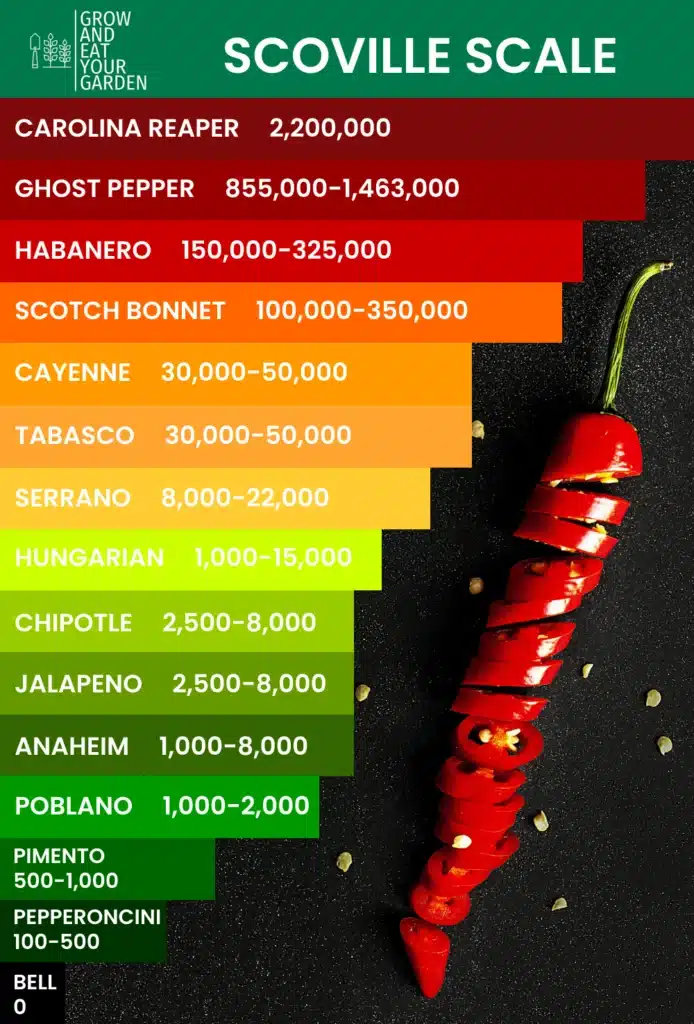In the spicy corners of the culinary world, habanero and ghost peppers hold a notorious reputation. They’re not just hot, they’re daredevil hot. And we’re here to put these two fiery contenders head to head.
Habanero peppers are compact, lantern-shaped, and boast a Scoville rating of 100,000-350,000 SHU. Ghost peppers, or Bhut Jolokia, are slightly elongated, have a pointed shape, and bring tears to the eyes with an infernal 855,000-1,041,427 SHU. It’s almost like comparing a bonfire with an erupting volcano!
Feeling brave enough? Let’s break down these two fire-breathers!
Comparison – Differences between habanero peppers and ghost peppers
Let’s look at the nitty-gritty details distinguishing habanero from ghost peppers:
- Habanero peppers vs ghost peppers heat level
- Habanero peppers vs ghost peppers flavor
- Habanero peppers vs ghost peppers texture
- Habanero peppers vs ghost peppers size and shape
- Habanero peppers vs ghost peppers nutrition
- Habanero peppers vs ghost peppers cost and availability
- Unique difficulties
- Substitutions
| Criteria | Habanero Pepper | Ghost Pepper |
|---|---|---|
| Heat level | 100,000-350,000 SHU | 855,000-1,041,427 SHU |
| Flavor | Fruity, citrusy | Sweet and fruity with a hint of smoky undertones |
| Texture | Smooth | Wrinkled |
| Size | 1-2.5″ | 2.4-3.3″ |
| Shape | Lantern-shaped | Pointed and elongated |
| Nutrition (per 100g) | 36 Calories, 357% DV Vitamin C | 64 Calories, 89% DV Vitamin C |
| Substitutions | Scotch Bonnet | Trinidad Moruga Scorpion |
Habanero peppers vs ghost peppers heat level (in Scoville heat units)
Habanero peppers are a spice lover’s delight with a heat level of 100,000-350,000 SHU.
Ghost peppers are like the roller coaster ride for chilli enthusiasts, with a blistering 855,000-1,041,427 SHU. It’s like doing a firewalk, but for your mouth!

Habanero peppers vs ghost peppers flavor
Habanero peppers surprise you with a fruity, citrusy flavor, a rare find in the world of chillies.
Ghost peppers are complex: they start with a sweet and fruity flavor, but they’re also infamous for a subtle smoky undertone. It’s like a surprise party, where the surprise is a flaming inferno.
Habanero peppers vs ghost peppers texture
Habanero peppers are smooth to the touch, as if lulling you into a false sense of security.
Ghost peppers are wrinkled, perhaps an external representation of your expression once you’ve taken a bite!
Habanero peppers vs ghost peppers size and shape
Habanero peppers are compact, measuring about 1-2.5 inches long, and shaped like a lantern. How cute, right?
Ghost peppers are 2.4-3.3 inches long, pointed, and elongated, almost like they’re pointing straight to your pending doom.
Habanero peppers vs ghost peppers nutrition
Both habanero and ghost peppers are high in Vitamin C. While habanero peppers have 357% of your daily Vitamin C intake and 36 calories, ghost peppers offer 89% of daily Vitamin C and a higher calorie count of 64 per 100g. Who knew tears could be so nutritious?
Ready to turn up the heat in your kitchen? Whether you choose the habanero or the ghost pepper, always remember: In the world of peppers, it’s not just a heat wave—it’s a heat tsunami!
Habanero peppers vs ghost peppers cost and availability
Ghost peppers are not as easily available as habanero peppers, and often cost a little more due to their extreme heat and the resulting demand from heat enthusiasts. Habanero peppers, though also quite hot, are a staple in many supermarkets and local stores, so they’re generally more affordable and easy to find.
Unique difficulties
The most significant difficulty in cooking with habaneros and ghost peppers is managing the heat. You have to be extra careful not to touch your eyes or any sensitive skin after handling these peppers – trust me, it’s not a spa experience you’d enjoy! Also, it’s hard to gauge the amount to use, so start small. Remember, you can always add heat, but you can’t take it away.
Can you substitute habanero peppers for ghost peppers or vice versa?
Because of the considerable difference in their heat levels, substituting habaneros for ghost peppers (or vice versa) might drastically change your dish’s spiciness. If you’re looking for a similar heat level to habanero, consider the Scotch Bonnet. If you want a pepper close to the ghost pepper’s heat level, try the Trinidad Moruga Scorpion. These substitutes are for the brave at heart – and the cast-iron stomach.
Habanero peppers – a complete overview
Habanero peppers are like the little firecrackers of the pepper world – small but explosive!
Heat
Habanero peppers are hot, with an SHU rating between 100,000 and 350,000. If you think that’s not much, remember, jalapenos only reach a mere 8,000 at their spiciest!
Flavor
Habaneros have a unique fruity, citrusy flavor, which makes them a favorite for hot sauces and spicy dishes. They’re like a forbidden fruit – literally!
Size, shape, and texture
Habaneros are typically 1-2.5 inches long, with a lantern shape and smooth texture. They’re little packages of fiery fun.
Nutritional content and potential health benefits
Habaneros are not just about the heat. They’re packed with Vitamin C and capsaicin, which has anti-inflammatory properties. Now, if only they could soothe your burning tongue!
Cooking with habanero peppers
Habanero peppers are popular in sauces, salsas, and any dish where you want to bring the heat. Be careful, though – these peppers can go from fun to fire alarm real fast!
Ghost peppers – a complete overview
Ghost peppers, also known as Bhut Jolokia, are so hot, they’re almost paranormal!
Heat
Ghost peppers are some of the hottest peppers out there, with an SHU rating between 855,000 and 1,041,427. Eating one is like inviting a ghost to haunt your mouth.
Flavor
Ghost peppers have a sweet and fruity flavor, with a hint of smokiness. It’s like a sweet lullaby before the fiery storm.
Size, shape, and texture
Ghost peppers are longer than habaneros, about 2.4-3.3 inches long, and have a wrinkled texture. Their pointed, elongated shape is like a warning sign for the heat to come.
Nutritional content and potential health benefits
Like other hot peppers, ghost peppers are high in Vitamin C and capsaicin. But let’s be honest, you’re not eating a ghost pepper for its nutritional benefits. You’re eating it to test your courage!
Cooking with ghost peppers
Ghost peppers are commonly used in hot sauces and fiery dishes. Remember, a little goes a long way, unless you want your dinner guests to see actual ghosts!
There you have it! Whether you choose the habanero or the ghost pepper, just remember the golden rule of cooking with hot peppers: You’re not crying because of the heat; you’re just sweating from your eyes! Enjoy!
